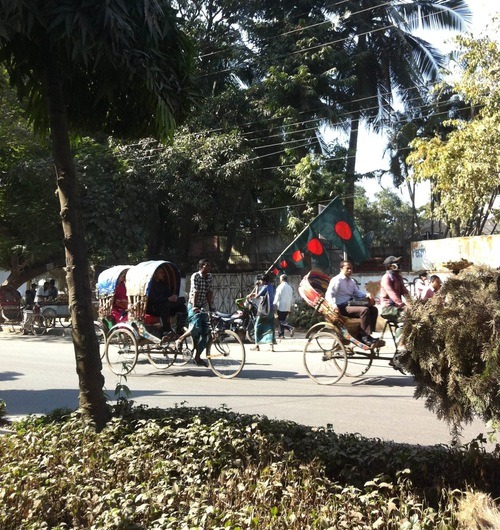
The strikes and violence in Bangladesh have been continuing, and as ever, it's been frustrating and annoying to myself and my family, but we're the lucky ones. To millions of others, it's been life-altering, in the worst of ways. The instability and insecurity that politicians are bringing to every day life is pushing people living on the breadline to their very limits, and most probably, beyond, with potentially irreversible consequences.
For those who are already living precariously, in a space where they don't have savings, where they make just about the right amount of money to pay their rent (if they have regular shelter), and pay for their food, or for their family, the sudden halt in their income due to the strikes must be turning their lives upside down. There has been no notice given of when strikes might happen, and no indication of when they might stop. These utterly random strikes, called on politicians' whims, are having drastic effects on the economy in many ways.
Drivers aren't needed when cars can't go on the roads; rickshaw-wallahs aren't needed when nobody's going outside; shop workers aren't needed when shops are closed. City-wide blockades stopping everything coming in and out of Dhaka have led to ports being overfull, deliveries not completed – factory workers aren't needed when materials can't get in, or out, of the city. Worst of all, people who live on the streets and earn their living in more informal ways - selling food on the streets, or making artisanal items to sell, for example - those who are already at the very edges of society, are being pushed even further towards the edges of extreme poverty.
So as a result of the strikes, millions of people, and their families, have found themselves without any source of income.
It's easy, and probably more convenient, to think of this as a “developing world” problem. People starving because they can't afford food, or selling their few belongings as a last resort.
But how many people living in “developed countries” would be able to cope in a similar situation? Would you?
Picture it: one day, you're told not to come into work, and you know that you won't get paid until further notice. You have no idea when this further notice might be. Add to that limited supplies of, well, everything (food, cash in the ATM, vegetables, fruit) - and, as the cherry on the cake, you're advised not to go outside, use public transport or drive your car, if you happen to have one, because, rumour has it, people are being paid on the streets (by political parties) to throw grenades and douse vehicles in petrol.
I would guess that anywhere in the world, a high proportion of people would be left in much the same situation as the millions of Bengalis here who have been put in this situation. The difference between us: call me naive, but I'd hope that other democratic nations wouldn't dream of doing this to their citizens.
People living in precarious situations isn't by any means exclusive to Bangladesh, but currently, the instability and insecurity that they face really is.
Saying there's a lack of social security here doesn't come close to covering it – it's not just that the government aren't providing social security, it's that they are the ones who are actively putting people in a situation where they will, without a doubt, be needing it, while doing nothing about it.
When I first arrived, I was a little shocked at how people didn't seem to understand when I described one aspect of my work – helping citizens hold government accountable. Now, I see why.
Right now, there's really no link whatsoever between what the population needs, and what the government, and other political parties, are doing here. If anything, politicians' actions over the past few weeks have brought only suffering to 99% of the population; this is anything but a democracy, and sadly I'm almost certain that the upcoming “elections” will prove that more than ever.